On the Cusp of Maturity and Going through an Unsure Future: What We Know About Gen Z So Far
One-in-ten eligible voters within the 2020 voters can be a part of a brand new era of People – Era Z. Born after 1996, most members of this era are usually not but sufficiently old to vote, however because the oldest amongst them flip 23 this 12 months, roughly 24 million could have the chance to solid a poll in November. And their political clout will proceed to develop steadily within the coming years, as increasingly of them attain voting age.
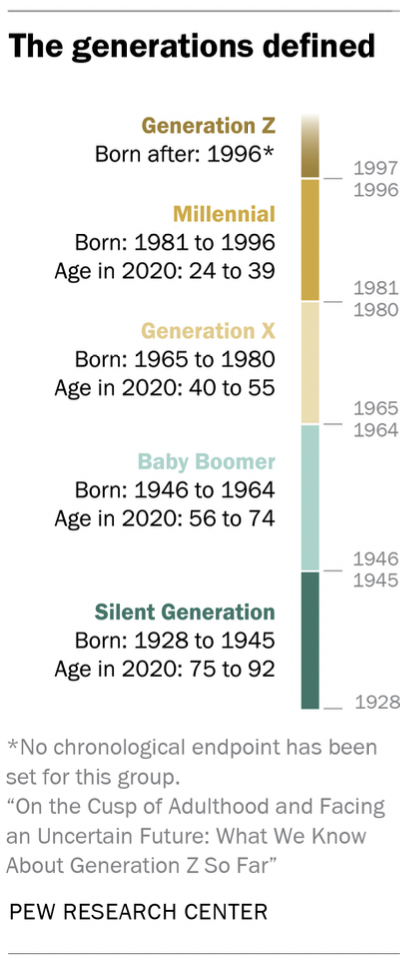
Not like the Millennials – who got here of age through the Nice Recession – this new era was in line to inherit a robust economic system with record-low unemployment. That has all modified now, as COVID-19 has reshaped the nation’s social, political and financial panorama. As a substitute of waiting for a world of alternatives, Gen Z now friends into an unsure future.
There are already indicators that the oldest Gen Zers have been significantly arduous hit within the early weeks and months of the coronavirus disaster. In a March 2020 Pew Analysis Heart survey, half of the oldest Gen Zers (ages 18 to 23) reported that they or somebody of their family had misplaced a job or taken a minimize in pay due to the outbreak. This was considerably greater than the shares of Millennials (40%), Gen Xers (36%) and Child Boomers (25%) who mentioned the identical. As well as, an evaluation of jobs knowledge confirmed that younger employees have been significantly susceptible to job loss earlier than the coronavirus outbreak, as they have been overrepresented in high-risk service sector industries.
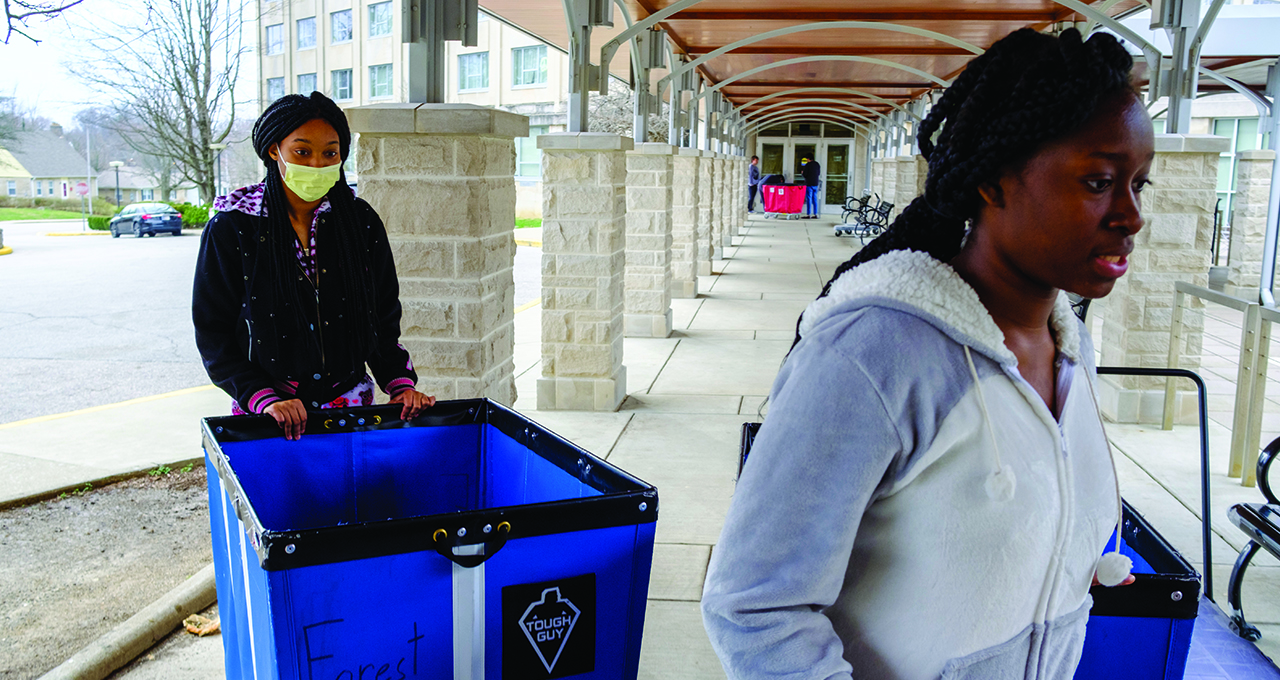
Other than the distinctive set of circumstances during which Gen Z is approaching maturity, what can we find out about this new era? We all know it’s totally different from earlier generations in some essential methods, however comparable in some ways to the Millennial era that got here earlier than it. Members of Gen Z are extra racially and ethnically numerous than any earlier era, and they’re on observe to be essentially the most well-educated era but. They’re additionally digital natives who’ve little or no reminiscence of the world because it existed earlier than smartphones.
Nonetheless, in the case of their views on key social and coverage points, they give the impression of being very very like Millennials. Pew Analysis Heart surveys performed within the fall of 2018 (greater than a 12 months earlier than the coronavirus outbreak) amongst People ages 13 and older discovered that, just like Millennials, Gen Zers are progressive and pro-government, most see the nation’s rising racial and ethnic range as a great factor, and so they’re much less seemingly than older generations to see america as superior to different nations.
A take a look at how Gen Z voters view the Trump presidency offers additional perception into their political views. A Pew Analysis Heart survey performed in January of this 12 months discovered that a few quarter of registered voters ages 18 to 23 (22%) authorized of how Donald Trump is dealing with his job as president, whereas about three-quarters disapproved (77%). Millennial voters have been solely barely extra prone to approve of Trump (32%) whereas 42% of Gen X voters, 48% of Child Boomers and 57% of these within the Silent Era authorized of the job he’s doing as president.
Gen Z is extra racially and ethnically numerous than earlier generations
Era Z represents the forefront of the nation’s altering racial and ethnic make-up. A naked majority (52%) are non-Hispanic white – considerably smaller than the share of Millennials who have been non-Hispanic white in 2002 (61%). One-in-four Gen Zers are Hispanic, 14% are black, 6% are Asian and 5% are another race or two or extra races.
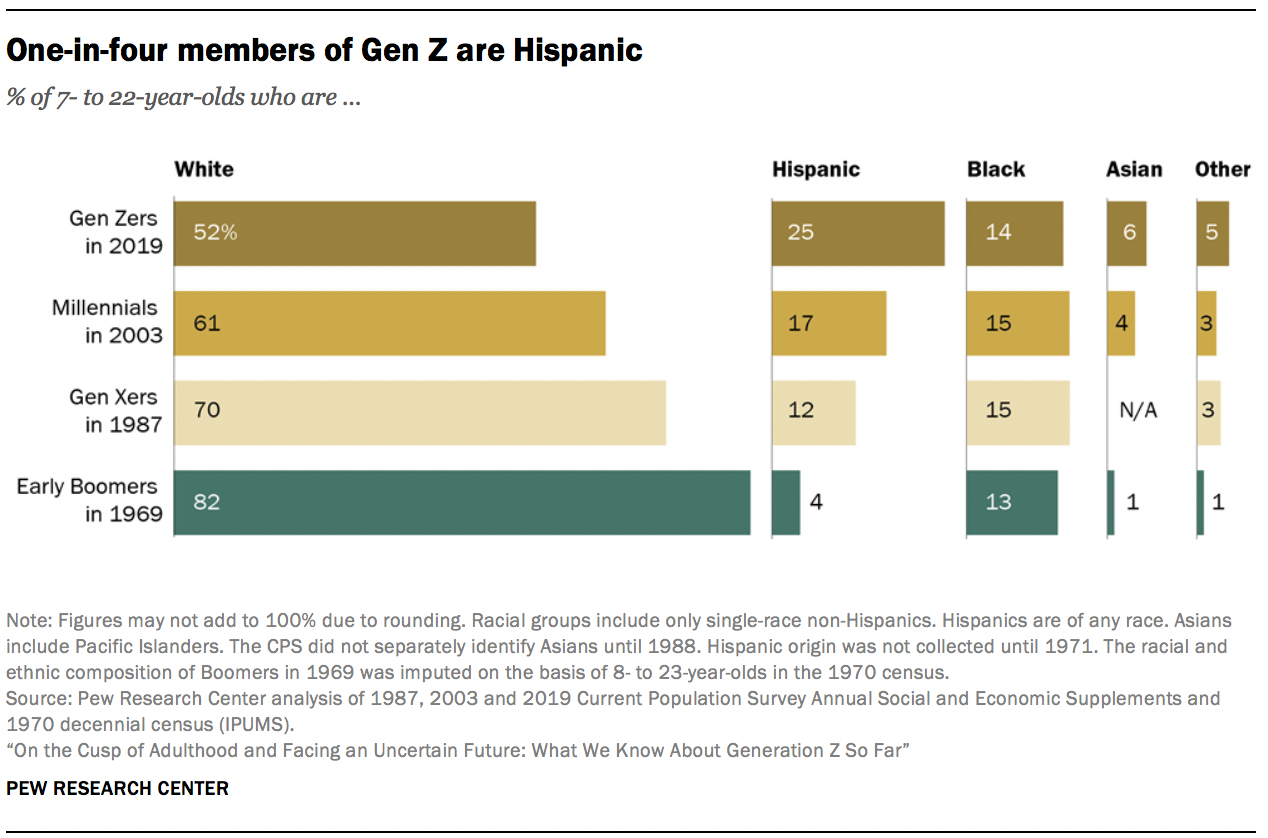
Gen Zers are barely much less seemingly than Millennials to be immigrants: 6% have been born exterior of the U.S., in contrast with 7% of Millennials on the similar age. However they’re extra prone to be the kids of immigrants: 22% of Gen Zers have at the least one immigrant dad or mum (in contrast with 14% of Millennials). Whilst immigration flows into the U.S. have diminished lately, new immigrants will be part of the ranks of Gen Z within the years to come back. Consequently, this era is projected to change into majority nonwhite by 2026, in response to Census Bureau projections.
In some areas of the U.S., Gen Z has already crossed this threshold. Within the West, solely 40% of Gen Zers are non-Hispanic white. Simply as many are Hispanic, whereas 4% are black, 10% are Asian and 6% are another race. Within the South, 46% of Gen Zers are non-Hispanic white. Minority illustration is lowest within the Midwest, the place greater than two-thirds of Gen Zers (68%) are non-Hispanic white.
Gen Z on observe to be the best-educated era but
A take a look at older members of Era Z suggests they’re on a considerably totally different academic trajectory than the generations that got here earlier than them. They’re much less prone to drop out of highschool and extra prone to be enrolled in school. Amongst 18- to 21-year-olds now not in excessive college in 2018, 57% have been enrolled in a two-year or four-year school. This compares with 52% amongst Millennials in 2003 and 43% amongst members of Gen X in 1987.
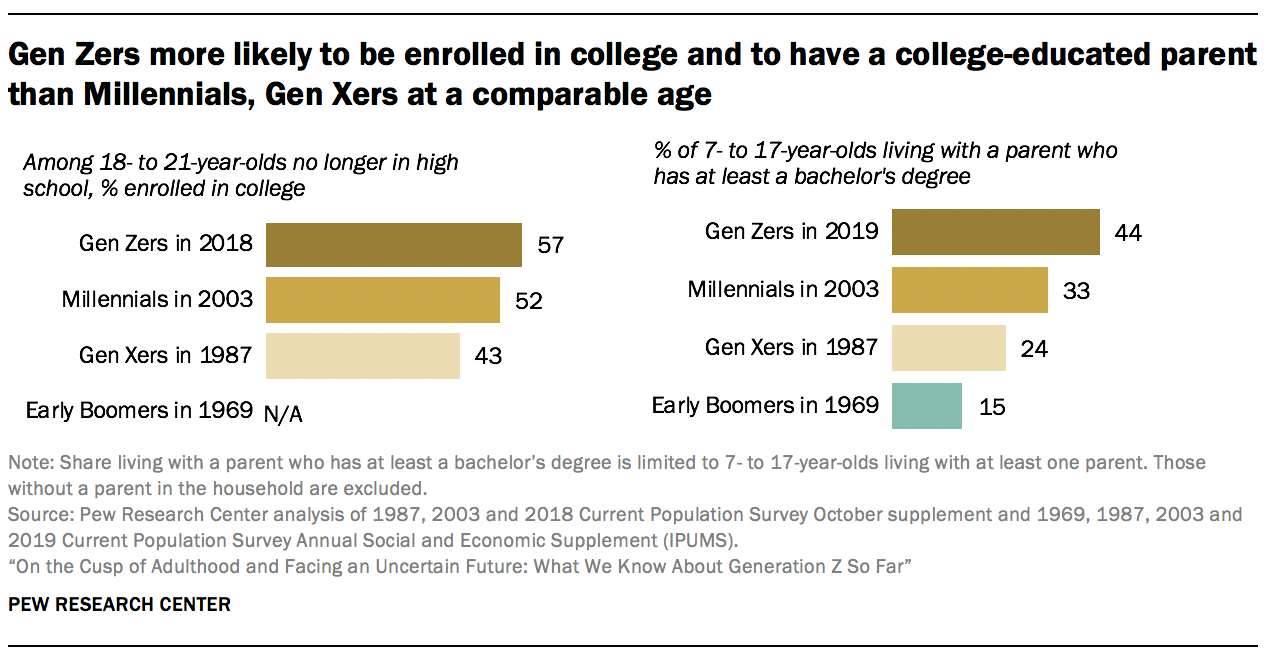
These altering academic patterns are tied to adjustments in immigration particularly amongst Hispanics. Gen Z Hispanics are much less seemingly than Millennial Hispanics to be immigrants, and former analysis has proven that second-generation Hispanic youth are much less prone to drop out of highschool and extra prone to attend school than foreign-born Hispanic youth.
Gen Zers are additionally extra prone to have a college-educated dad or mum than are earlier generations of younger individuals. In 2019, 44% of Gen Zers ages 7 to 17 have been dwelling with a dad or mum who had a bachelor’s diploma or extra training, in contrast with 33% of Millennials after they have been the identical age. Each of those traits mirror the general pattern towards extra People pursuing greater training.
Maybe as a result of they’re extra prone to be engaged in academic endeavors, Gen Zers are much less prone to be working than earlier generations after they have been teenagers and younger adults. Solely 18% of Gen Z teenagers (ages 15 to 17) have been employed in 2018, in contrast with 27% of Millennial teenagers in 2002 and 41% of Gen Xers in 1986. And amongst younger adults ages 18 to 22, whereas 62% of Gen Zers have been employed in 2018, greater shares of Millennials (71%) and Gen Xers (79%) have been working after they have been a comparable age.

Gen Zers and Millennials have comparable viewpoints on many main problems with the day
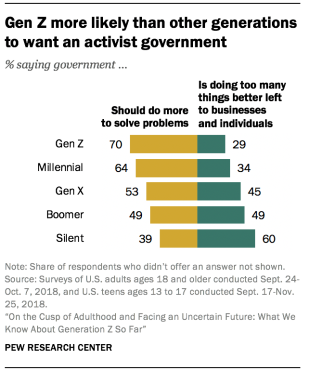
The views of Gen Z mirror these of Millennials in some ways. Nonetheless, survey knowledge collected in 2018 (properly earlier than the coronavirus outbreak) exhibits that there are locations the place this youthful era stands out as having a considerably totally different outlook.
For instance, members of Gen Z are extra seemingly than older generations to look to authorities to resolve issues, quite than companies and people. Absolutely seven-in-ten Gen Zers say the federal government ought to do extra to resolve issues, whereas 29% say authorities is doing too many issues higher left to companies and people. A considerably smaller share of Millennials (64%) say authorities ought to do extra to resolve issues, and this view is even much less prevalent amongst older generations (53% of Gen Xers, 49% of Boomers and 39% of Silents).
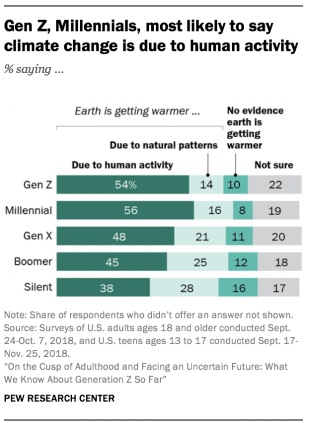
For essentially the most half, nonetheless, Gen Zers and Millennials share comparable views on points dealing with the nation. These youthful generations are extra seemingly than their older counterparts to say the earth is getting hotter because of human exercise: 54% of Gen Z and 56% of Millennials say this, in contrast with smaller shares of Gen Xers, Boomers and Silents (48%, 45% and 38%, respectively).
Relating to race relations, Gen Zers and Millennials are about equally prone to say that blacks are handled much less pretty than whites on this nation. Roughly two-thirds of Gen Zers and Millennials say this, in contrast with about half of Gen Xers and Boomers and smaller shares among the many Silent Era.
Youthful generations additionally share a distinct view of the U.S. relative to different nations on the earth. Gen Zers (14%) and Millennials (13%) are much less seemingly than Gen Xers (20%), Boomers (30%) or Silents (45%) to say the U.S. is best than all different nations. Nonetheless, pluralities of each era besides the Silent Era say the U.S. is without doubt one of the finest nations on the earth together with some others.
Throughout the GOP, Gen Zers have sharp variations with their elders
Amongst Republicans and people who lean to the Republican Celebration, there are hanging variations between Era Z and older generations on social and political points. Of their views on race, Gen Z Republicans are extra seemingly than older generations of Republicans to say blacks are handled much less pretty than whites within the U.S. at present. Absolutely 43% of Republican Gen Zers say this, in contrast with 30% of Millennial Republicans and roughly two-in-ten Gen X, Boomer and Silent Era Republicans. Views are rather more constant throughout generations amongst Democrats and Democratic leaners.
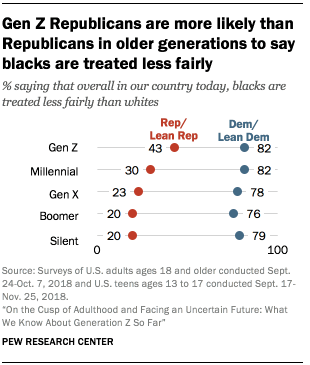
Equally, the youngest Republicans stand out of their views on the function of presidency and the causes of local weather change. Gen Z Republicans are more likely than older generations of Republicans to want an elevated authorities function in fixing issues. About half (52%) of Republican Gen Zers say authorities ought to do extra, in contrast with 38% of Millennials, 29% of Gen Xers and even smaller shares amongst older generations. And the youngest Republicans are much less seemingly than their older counterparts to attribute the earth’s warming temperatures to pure patterns, versus human exercise (18% of Gen Z Republicans say this, in contrast with three-in-ten or extra amongst older generations of Republicans).
General, members of Gen Z look just like Millennials of their political preferences, significantly in the case of the upcoming 2020 election. Amongst registered voters, a January Pew Analysis Heart survey discovered that 61% of Gen Z voters (ages 18 to 23) mentioned they have been positively or in all probability going to vote for the Democratic candidate for president within the 2020 election, whereas a few quarter (22%) mentioned they have been planning to vote for Trump. Millennial voters, equally, have been more likely to say they plan to help a Democrat in November than Trump (58% vs. 25%). Bigger shares of Gen X voters (37%), Boomers (44%) and Silents (53%) mentioned they plan to help President Trump.

Youthful generations see household, societal change as a great factor
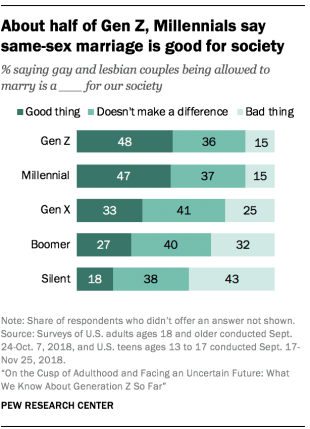
Throughout numerous measures, Gen Zers and Millennials stand out from older generations of their views of household and societal change. Roughly half of Gen Zers (48%) and Millennials (47%) say homosexual and lesbian {couples} being allowed to marry is an effective factor for our society. By comparability, solely one-third of Gen Xers and about one-quarter of Boomers (27%) say it is a good factor. Pluralities of Boomers and Gen Xers say it doesn’t make a distinction. Members of the Silent Era are the most definitely to view this as a foul factor for society.
There’s a comparable sample in views of individuals of various races marrying one another, with bigger shares of Millennials and Gen Zers saying it is a good factor for our society, in contrast with older generations. Only a few throughout generations say it is a unhealthy factor for society.
Gen Zers and Millennials are much less seemingly than older generations to say that single girls elevating kids on their very own is a foul factor for society. Nonetheless, comparatively few in each generations say it is a good factor for society, whereas about half say it doesn’t make a lot distinction (roughly just like the shares amongst older generations).
Relating to their very own house life, the experiences of Gen Z mirror, partially, broad traits which have reshaped the American household in current many years. In response to a Pew Analysis Heart evaluation of Census Bureau knowledge, about three-in-ten (29%) reside in a family with an single dad or mum whereas 66% reside with two married mother and father. A roughly comparable share of Millennials (69%) lived with two married mother and father at an identical age, however the shares amongst Gen Xers and Boomers have been considerably bigger (72% and 86%). Of these Gen Zers who’re dwelling with two married mother and father, usually each of these mother and father are within the labor pressure (64%). This compares with a barely greater share of Millennials who have been dwelling with two mother and father at a comparable age (66% had two mother and father within the labor pressure) and a barely decrease share of Gen Xers (61%).
Generations differ of their familiarity and luxury with utilizing gender-neutral pronouns
Concepts about gender identification are quickly altering within the U.S., and Gen Z is on the entrance finish of these adjustments. Gen Zers are more likely than these in older generations to say they personally know somebody who prefers to go by gender-neutral pronouns, with 35% saying so, in contrast with 25% of Millennials, 16% of Gen Xers, 12% of Boomers and simply 7% of Silents. This generational sample is clear amongst each Democrats and Republicans.
There are additionally stark generational variations in views of how gender choices are offered on official paperwork. Gen Z is by far the most definitely to say that when a type or on-line profile asks about an individual’s gender it ought to embrace choices apart from “man” and “girl.” About six-in-ten Gen Zers (59%) say kinds or on-line profiles ought to embrace extra gender choices, in contrast with half of Millennials, about four-in-ten Gen Xers and Boomers (40% and 37%, respectively) and roughly a 3rd of these within the Silent Era (32%).
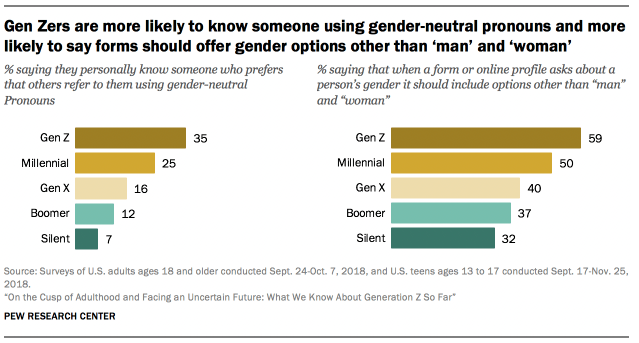
These views range broadly alongside partisan strains, and there are generational variations inside every get together coalition. However these variations are sharpest amongst Republicans: About four-in-ten Republican Gen Zers (41%) suppose kinds ought to embrace extra gender choices, in contrast with 27% of Republican Millennials, 17% of Gen Xers and Boomers and 16% of Silents. Amongst Democrats, half or extra in all generations say this.
Gen Zers are just like Millennials of their consolation with utilizing gender-neutral pronouns. Each teams specific considerably greater ranges of consolation than different generations, although generational variations on this query are pretty modest. Majorities of Gen Zers and Millennials say they’d really feel “very” or “considerably” comfy utilizing a gender-neutral pronoun to discuss with somebody if requested to take action. By comparability, Gen Xers and Boomers are about evenly divided: About as many say they’d really feel at the least considerably comfy (49% and 50%, respectively) as say they’d be uncomfortable.
Members of Gen Z are additionally just like Millennials of their views on society’s acceptance of those that don’t establish as a person or a lady. Roughly half of Gen Zers (50%) and Millennials (47%) suppose that society just isn’t accepting sufficient of those people. Smaller shares of Gen Xers (39%), Boomers (36%) and people within the Silent Era (32%) say the identical.
Right here once more there are giant partisan gaps, and Gen Z Republicans stand other than different generations of Republicans of their views. About three-in-ten Republican Gen Zers (28%) say that society just isn’t accepting sufficient of people that don’t establish as a person or girl, in contrast with two-in-ten Millennials, 15% of Gen Xers, 13% of Boomers and 11% of Silents. Democrats’ views are practically uniform throughout generations in saying that society just isn’t accepting sufficient of people that don’t establish as a person or a lady.
Teenagers and expertise

Trying on the relationship American teenagers have with expertise offers a window into the experiences of a big section of Era Z. In response to a 2018 Pew Analysis Heart survey, 95% of 13- to 17-year-olds have entry to a smartphone, and an identical share (97%) use at the least one in every of seven main on-line platforms.
YouTube, Instagram and Snapchat are amongst teenagers’ favourite on-line locations. Some 85% say they use YouTube, 72% use Instagram and 69% use Snapchat. Fb is much less in style with teenagers – 51% say they use this social media web site. Some 45% of teenagers say they’re on-line “virtually always,” and a further 44% say they’re on-line a number of occasions a day.
Some researchers have urged that the rising period of time teenagers are spending on their cellular units, and particularly on social media, is contributing to the expansion in nervousness and melancholy amongst this group. Teenagers have combined views on whether or not social media has had a constructive or unfavorable impact on their era. About three-in-ten (31%) say the impact on individuals their very own age has been largely constructive, 24% say it’s been largely unfavorable, and 45% say it’s been neither constructive nor unfavorable.
Many teenagers who say social media has had a constructive impact say a serious cause they really feel this fashion is as a result of it helps them keep linked with family and friends (40% of teenagers who say social media has a largely constructive impact say this). For many who see the impact of social media as unfavorable, the commonest cause cited is that it results in bullying and rumor spreading (27% of teenagers who say social media has a largely unfavorable impact say this).






























































